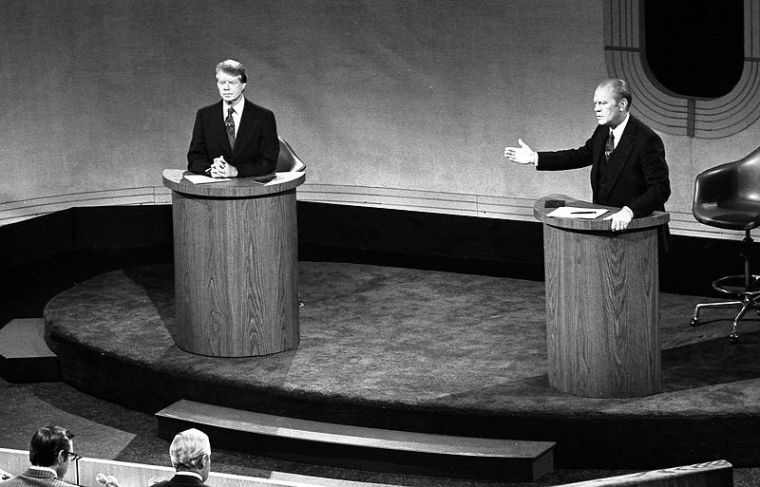10 memorable moments in presidential debates
Published 2:53 pm Monday, July 14, 2014

- 800px-Carter_and_Ford_in_a_debate,_September_23,_1976.jpg
President Barack Obama will debate Mitt Romney for the first time Wednesday night in arguably the most anticipated event of the campaign season.
Who doesn’t like a good debate? Debates hold the potential to etch lasting impressions in voters’ minds about presidential candidates’ personalities and policy positions. And part of the appeal of debates stems from memories of past showdowns that have left enduring imprints on our collective political consciousness. (Though, as history shows, there are few examples of debates dramatically shifting the trajectory of a campaign.)
Below is our list of the top 10 moments from past presidential debates, in reverse chronological order. The rundown includes moments that shook up campaigns, others that revealed something telling about a candidate’s temperament, and the zingers and one-liners against which all campaign quips are compared:
2008: John McCain calls Barack Obama “that one”
McCain’s altogether head-scratching use of the term “that one” when discussing an energy bill Obama supported was not the kind of debate attention the Republican needed to generate as he sought to make up ground in the polls. It set off a round of post-debate debating in the media (was it a stroke of condescension, contempt, or was it just plain confusing?), which was not the kind of news the underdog McCain was hoping to generate.
2000: Al Gore’s sighs
Debates are as much about conveying personality as politics. Gore’s sighs at a debate with George W. Bush in 2000 came across as condescending, a perception that didn’t help his cause in a historically close race.
1992: George H.W. Bush checks his watch
The incumbent conspicuously checked his watch just as an audience member began a question about how the national debt has affected him personally. What’s more, it took the president a couple more minutes to come to terms with the question. The exchange fueled the contrast with Bill Clinton, who excelled at appearing to empathize more than the Republican.
1992: James Stockdale asks: “Who am I? Why am I here?”
Stockdale, a decorated Vietnam veteran, was third-party candidate Ross Perot’s running mate. His unique opening earned him some laughs, but in the long run, also made him the subject of jokes that undercut his aim of being a serious contender.
1988: Michael Dukakis and the death penalty
When asked whether he would favor an irrevocable death penalty for someone who raped and murdered his wife, Dukakis, the Democratic nominee, quickly answered that he wouldn’t. While a calm and efficient response would seem befitting for most debate questions, Dukakis’s automatic, technical answer to such an emotionally distressing question didn’t sit will with voters looking for a more human response.
1988: Lloyd Bentsen tells Dan Quayle: “You’re no Jack Kennedy”
Just about every political put-down has to be compared to this one from the vice presidential debate 24 years ago. Quayle defended his experience and readiness to be president by noting that he had “as much experience as Jack Kennedy did, when he sought the presidency.” The Democratic vice presidential nominee replied curtly: “Senator, I served with Jack Kennedy. I knew Jack Kennedy. Jack Kennedy was a friend of mine. Senator, you’re no Jack Kennedy.”
1984: Ronald Reagan says he won’t exploit Walter Mondale’s “youth and inexperience”
Facing questions about this age, the incumbent turned the argument on its head, earning laughter from the audience when he delivered this line about Mondale. This debate was a reminder that humor holds the potential to defuse issues that are difficult to navigate.
1980: Reagan: “There you go again”
After Jimmy Carter cast him as an opponent of Medicare and expanding health insurance in debate No. 2, Reagan’s memorable line was an effective jumping off point for a rebuttal. Taken together with his also memorable “are you better off?” closing argument, Reagan commanded the attention in this debate.
1976: Gerald Ford: “There is no Soviet domination of Eastern Europe”
During a debate against Carter, the Republican president’s declaration prompted a double take from moderator Max Frankel. “I don’t believe that the Poles consider themselves dominated by the Soviet Union,” Ford added. His words appeared very out of step with the conventional wisdom on communism at the time and would dominate media coverage for days following the debate. This is an example of a costly debate misstep.
1960: Richard Nixon and preparing for TV
Making history as the first televised presidential debate, this showdown illustrated the importance of being telegenic. Coming off a stump speech, Nixon declined the use of makeup, and he came across as the less relaxed candidate compared to Kennedy, who took the day away from the trail to prepare. Kennedy also used some makeup.

